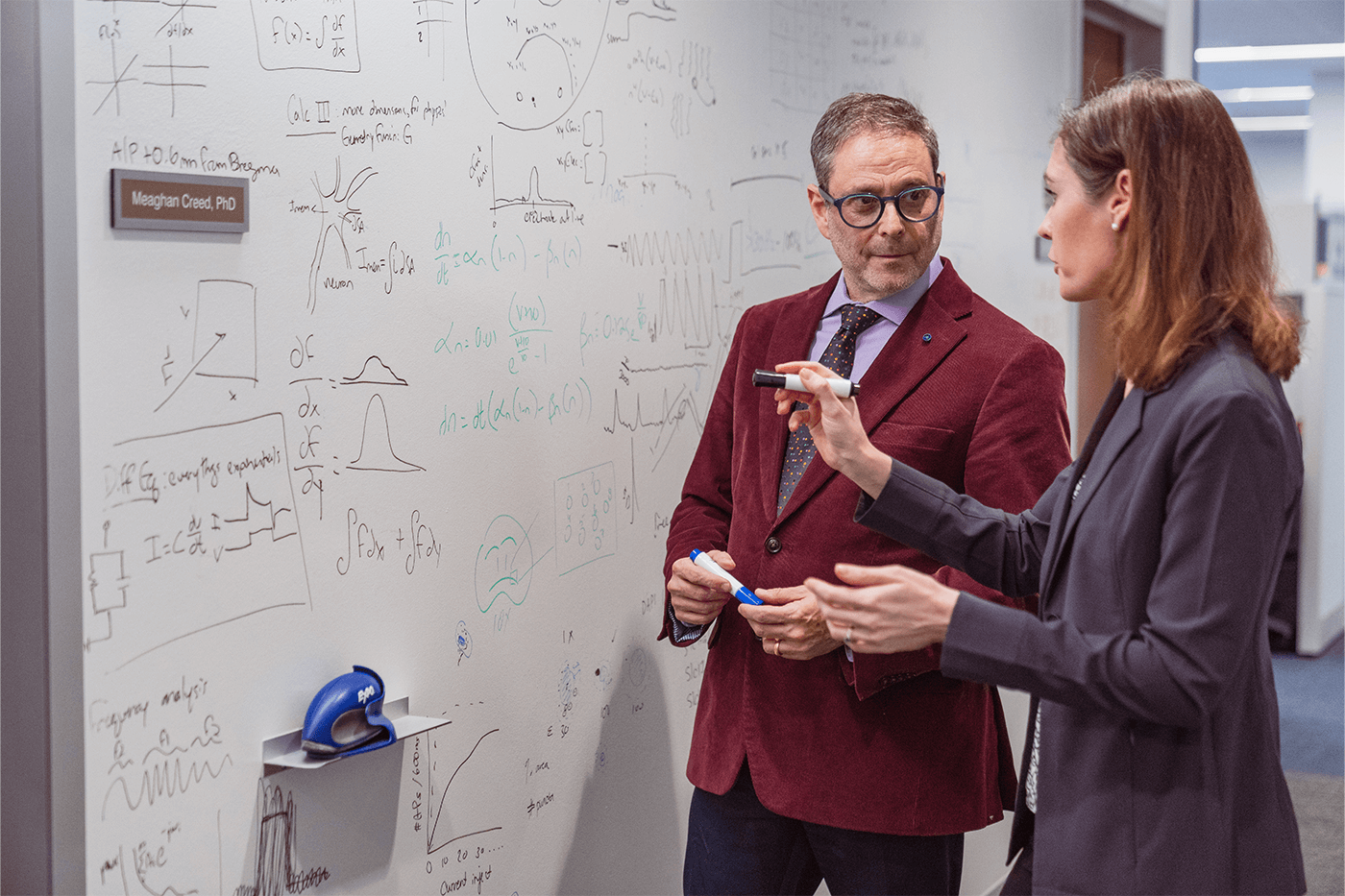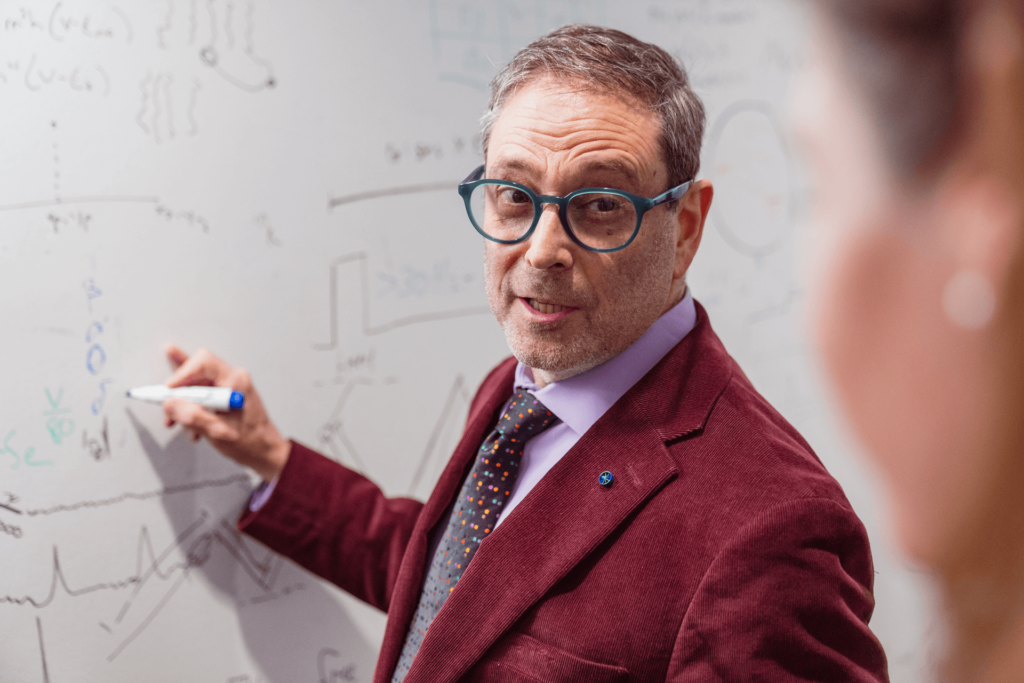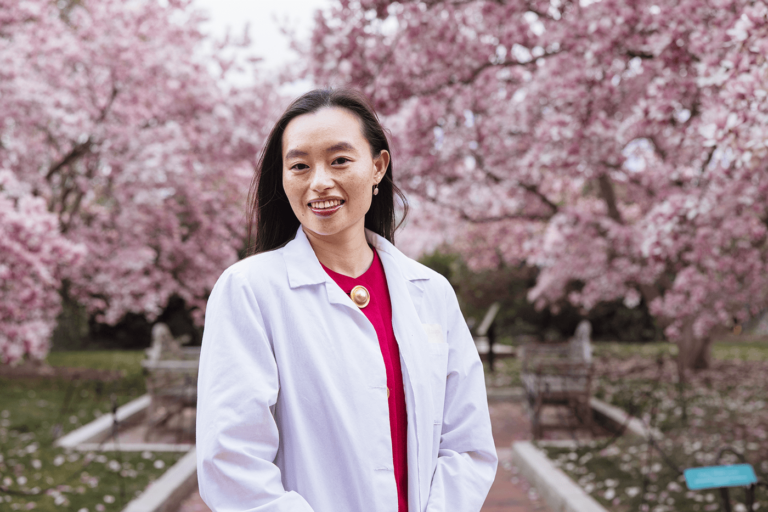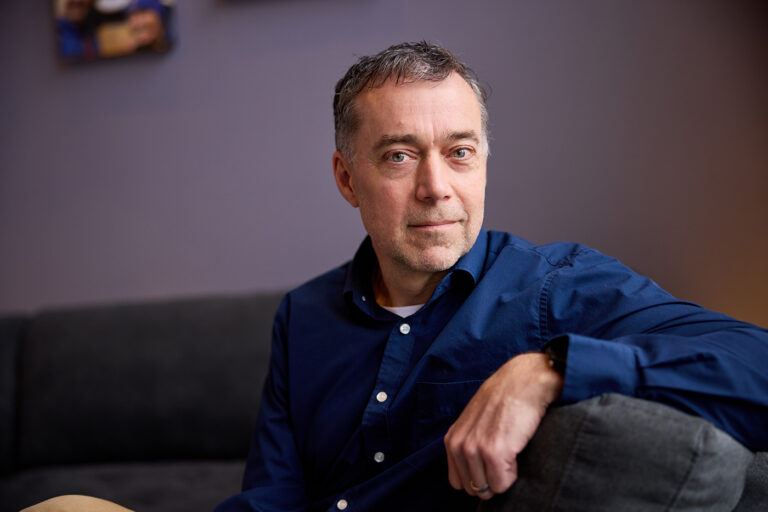The healing power of neuroscience
Michael S. Avidan, MBBCh, FCASA

By Juli Leistner
Physician-scientist Michael Avidan, MBBCh, leads WashU Medicine’s Department of Anesthesiology, a world leader in anesthesiology research, education, and patient care. His department currently ranks No. 1 in NIH funding, with studies ranging from seeking a fundamental understanding of the brain to advancing new approaches to anesthesiology care and pain management. Avidan’s own research involves many areas of anesthesiology and intensive care, including prevention of neurologic complications from surgical general anesthesia. He is co-director of the Center for Perioperative Mental Health, which addresses older adults’ mental health needs related to surgery, and heads the Anesthesiology Postdoctoral Research Training Program. Originally from South Africa, Avidan joined the WashU faculty in 2001 and became department head in 2019. He was elected to the prestigious National Academy of Medicine in 2023.
“Mental health relates to how our brains are wired, so by understanding more about that circuitry and how it works in health and disease, we can fix the mental health challenges that we all face. I know that we will be successful in doing that.”
Michael S. Avidan, Dr. Seymour and Rose T. Brown Professor of Anesthesiology
Head, Department of Anesthesiology at WashU Medicine
What excites you most about the future of neuroscience at WashU?
What I’m most excited about is that we’re poised to make seminal discoveries that will truly transform human lives. Neuroscience focuses on understanding the brain, which is right at the center of addressing many of today’s biggest health issues — addiction, chronic pain, mental illness, and many other huge challenges. We are truly on the brink of solving these issues, and I feel very privileged to be a part of it.
Neuroscientists across WashU Medicine have recently moved into the new Jeffrey T. Fort Neuroscience Research Building, also called Fort Labs. How has this facility changed WashU neuroscience?
Fort Labs already is having an absolutely transformative effect. At most institutions, scientists work in siloed laboratories, and research can be fragmented. But at Fort Labs, the laboratories are these vast open spaces that bring together research teams from many different disciplines who are studying similar scientific questions. They work side by side in one space. Just one interesting example: We have a multidisciplinary group studying stroke, where every second counts in preventing brain damage. We are exploring methods to slow down the brain’s metabolism so that the brain needs less oxygen and can survive longer while physicians address the stroke. We’ve already seen that teams like these contribute to one another’s success and accelerate discovery. With the wealth of talent that we have brought into this building, I think we will see incredible results going forward.

As a neuroscientist, if you could change one thing in the world, what would it be?
Well, I am going to pick three, and they’re linked: I would address pain, mental distress, and sleep. WashU Medicine is at the forefront of research in all of these areas.
Regarding pain, today about a third of all Americans have chronic pain. We have effective medicines for pain, but many of them have terrible side effects. If we could cure pain, we would transform the lives of over 100 million Americans. Think about the public health impact of that.
I predict that we will do just that — cure chronic pain — and fairly soon. Why am I so confident? Because every day we learn more about the brain circuits that drive pain, understanding which ones are necessary and which ones can be interrupted to stop pain. That knowledge is allowing us to develop medicines that treat pain without life-threatening side effects. We are on the brink of putting these new drugs into clinical trials.
I chose mental distress because we have a mental health crisis right now in our country. Much of the suffering goes unseen, undiagnosed, and untreated, and it is vastly underestimated — like the tip of an iceberg. You cannot live a fulfilled life if you are suffering from mental anguish, anxiety, or depression. Mental health relates to how our brains are wired, so by understanding more about that circuitry and how it works in health and disease, we can fix the mental health challenges that we all face. I know that we will be successful in doing that.
And my third area is sleep. What I personally want more than anything at the end of the day is to have six to eight hours of peaceful, restorative sleep, and I think every human being deserves that. Researchers in Fort Labs are among the foremost sleep-medicine experts in the world. They are learning why we sleep, why sleep goes wrong, how sleep contributes to health, and how it relates to important conditions such as Alzheimer’s disease. I am confident we will continue to make huge gains in this area of research.

How has philanthropy shaped neuroscience research at WashU Medicine?
It’s certainly true that NIH grants are critically important to our day-to-day research. Philanthropic gifts, on the other hand, are transformational. They fund bold ideas in a way that NIH funding does not, and they create a seismic shift in our ability to advance science and to truly change the world. The impact of philanthropy resonates through the decades; it will take us in new directions to pursue ideas we have not even yet imagined.
WashU Medicine is making a tremendous impact on advancing major health challenges for our society. We want to enable people to live better, healthier lives. With philanthropic support, I absolutely know that we will get there.
From WashU to DARPA
In her first year of high school, Alissa Ling, AB ’18, started volunteering more than 10 hours a week at Walter Reed Military Medical Center. There, she first learned about emerging rehabilitation devices — like brain-controlled prosthetic arms — that offered soldier amputees a rare and vital return to mobility.
Expert hands, timely hope
WashU Medicine’s Taylor Family Department of Neurosurgery is home to the latest innovations in neurosurgery and neurotechnology to address complex brain tumors. Eric C. Leuthardt, MD, performed a groundbreaking, minimally invasive procedure in 2010.
A new era in mental health research
Eric Lenze, BA ’90, MD ’94, leads the Department of Psychiatry at WashU Medicine, which has a long history of international excellence in research, education, and patient care.








